This year one of the biggest threats to humankind could be humanity itself.
The World Health Organisation (WHO) has officially named the reluctance or downright refusal to vaccinate as one of the top ten greatest health challenges of 2019.
The problem is known as "vaccine hesitancy", and it's a complex issue that can stem from a whole variety of roadblocks, including complacency about health care, inconvenience in accessing vaccines and poor confidence in the very nature of vaccines themselves.
Yet unlike many of the other public health threats added to this list - such as air pollution, climate change and antibiotic resistance - this particular issue has a clear and effective solution. The main difficulty is convincing people of the facts.
Despite overwhelming scientific evidence that vaccines are both safe and effective, vaccination rates have plateaued just short of reaching acceptable levels, and a scary number of people continue to hold dangerous and false beliefs about what vaccines actually achieve.
A part of this could be a lingering sense of unease and mistrust, brought about by negative past media coverage like the MMR-autism debacle.
It seems that once humans have an idea about something, no matter how scientifically accurate, it is very difficult for us to break past those preconceived notions.
"The reasons for this rise [in vaccine hesitancy] are complex, and not all of these cases are due to vaccine hesitancy," the report acknowledges.
"However, some countries that were close to eliminating the disease have seen a resurgence."
Already, the fallout from a growing anti-vaccination movement is being felt the world over, and it threatens to reverse decades of progress in eradicating what are entirely preventable and, at times, life-threatening diseases.
Since the turn of the century, the measles vaccine has saved over 21 million lives, decreasing the global death toll by 80 percent in just 17 years. But now that we are closer than ever to the finish line, for some reason, we have started running in the opposite direction.
A survey released last year, for instance, found that America's trust in vaccines is slipping to dangerous levels. But by no means is this growing sense of skepticism confined to just the US.
In 2017, the number of reported measles cases spiked by more than 30 percent worldwide, even though this contagious disease is easily preventable through two doses of a vaccine.
The resurgence of measles and other preventable diseases is a serious concern, and it's one that WHO and its partners are determined to tackle in 2019.
In the coming year, the organisation wants to ramp up its efforts to eliminate cervical cancer worldwide by increasing the coverage of the HPV vaccine. At the same time, it has also pledged to halt the spread of wild poliovirus in Afghanistan and Pakistan.
"Health workers, especially those in communities, remain the most trusted advisor and influencer of vaccination decisions, and they must be supported to provide trusted, credible information on vaccines," the report reads.
Today, vaccines prevent two to three million deaths a year, but if global coverage was improved, a further 1.5 million people could have their lives saved each year.
One of the only things holding us back is ourselves.
The list of health challenges in 2019 has been published online by the World Health Organisation.
